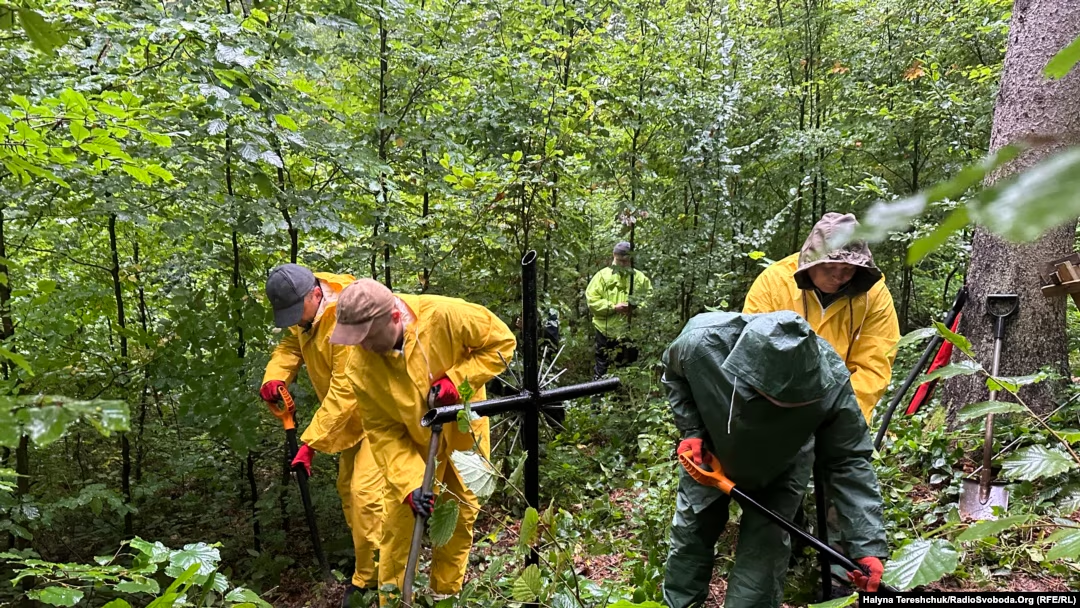A Ukrainian expedition from Lviv’s memorial and search center Dolia (Fate) has started excavation work in the Carpathian forest near the village of Yurechkova in Poland’s Subcarpathian Voivodeship, Radio Liberty reported on 30 September.
The site may contain the remains of up to 18 Ukrainian Insurgent Army soldiers who died in combat with Polish communist forces in March 1947.
“The UPA fighters were defending themselves while protecting the civilian Ukrainian population from forced deportation,” according to Ukrainian specialists.
Heavy rain in the Bieszczady Mountains hampered initial operations. The team used a motorized cultivator to clear obstacles and is removing soil to a depth of one meter to determine if there are signs of disturbance. A metal cross previously marked the suspected burial site.
The battle in Yurechkova took place on 4 March 1947, though at a different location from the current search area. How the fallen fighters were transported and who moved them remains unknown.
Before World War II, the village belonged to the Dobromyl district of Lviv Voivodeship, inhabited primarily by Ukrainian Greek Catholics. In September 1939, the Red Army’s arrival placed Yurechkova under Soviet control as part of Drohobych Oblast. After the war ended in 1945, the village returned to Poland.
Forced deportations of Ukrainians began immediately, but the UPA organized resistance from local Ukrainians. From April 1947, Ukrainian residents were expelled from Yurechkova during Operation Vistula to western and northern Poland—a forced deportation resulting from agreements between Soviet and Polish communist authorities.
Ukrainian and Polish sides have exchanged lists of locations for search and exhumation work related to World War II victims. Poles plan to conduct research at 13 sites in Ukraine, while Ukrainians will work at four locations in Poland.
Completed operations include excavations at the non-existent village of Puzhnyky in Ternopil Oblast from the 1945 period, where 42 civilian and military remains were found, and in Lviv, where over 40 Polish Army soldiers who died defending the city from German forces in September 1939 were discovered.
Ukraine cannot propose more locations due to the war, shortage of specialists—some of whom have been mobilized—and financial difficulties, according to the Ukrainian Institute of National Memory.
Ukrainian specialists are conducting the search in Yurechkova under observation by representatives from Poland’s Institute of National Remembrance, with Polish police providing security.
The Ukrainian Institute of National Memory explained that this location became the first from the list of Ukrainian memorial sites on Polish territory for which Poland granted permission to conduct search and exhumation work.
The Ukrainian team will search until 4 October. If remains are found, exhumation will begin and continue for up to a month.
The UPA, or Ukrainian Insurgent Army, was a Ukrainian nationalist partisan military formation founded in 1942, by the Organization of Ukrainian Nationalists (OUN). Its main goal was to establish an independent Ukrainian state.
There are oother recent exhumations taking place concerning mass graves linked to WWII and its aftermath in both Poland and Ukraine. In Ukraine’s Ternopil region (formerly Polish territory before WWII), the remains of 42 Polish victims of massacres by Ukrainian nationalists were discovered and ceremoniously reburied in 2025. This was part of a diplomatic breakthrough allowing exhumations that had been banned since 2017, aimed at reconciliation between Poland and Ukraine.




